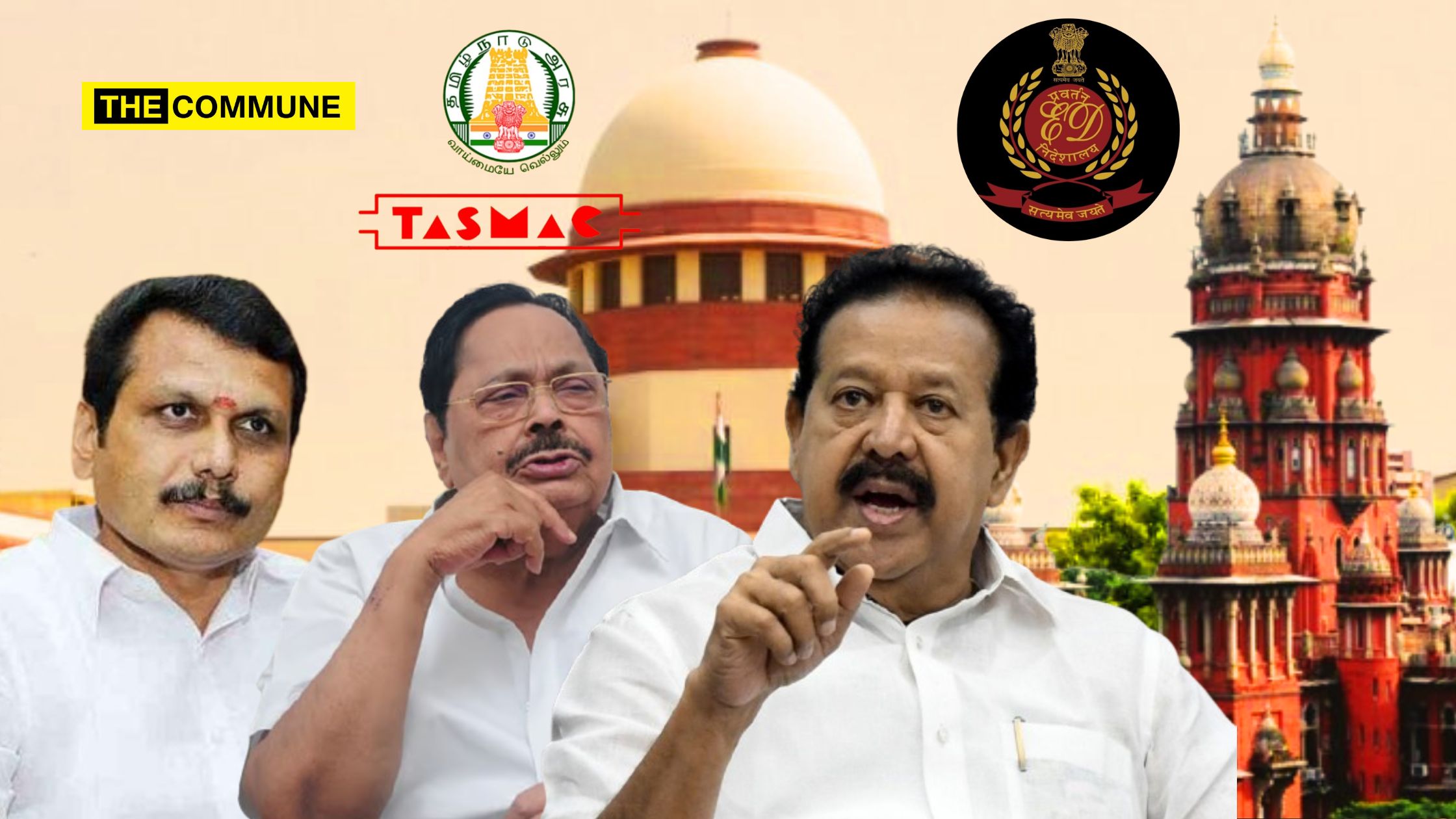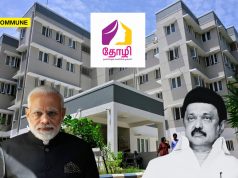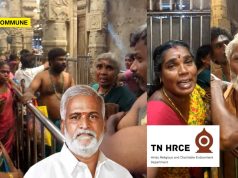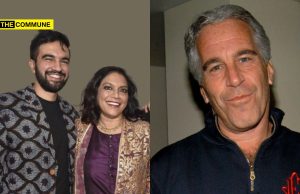
The ruling DMK is currently grappling with mounting public dissatisfaction, driven by growing anti-incumbency sentiments and widespread criticism of its handling of law and order, among other administrative shortcomings. Adding to its woes, the party is now under intense judicial scrutiny, with several of its sitting ministers facing serious corruption allegations. On just one day — 23 April — the judiciary delivered multiple setbacks for the DMK including, Electricity, Prohibition and Excise Minister V. Senthil Balaji, Forest Minister K. Ponmudy, and the party’s general secretary and Water Resources Minister Duraimurugan all found themselves in legal trouble. To make matters worse, the party also faced a blow in the case related to Enforcement Directorate raids on TASMAC, involving alleged financial irregularities to the tune of ₹1,000 crore. In each of these cases, the court’s stance went against the DMK, intensifying the political heat on the party’s leadership.
Below are the details of each case:
Supreme Court Issues Ultimatum To DMK Min Senthil Balaji: Bail or Cabinet?
A two-judge bench of Justices Abhay S. Oka and Augustine George Masih was hearing a plea by the Enforcement Directorate (ED) seeking cancellation of the bail granted to Balaji on 26 September 2024. The ED argued that Balaji resumed his role as a minister shortly after obtaining bail and could potentially influence witnesses in the ongoing case linked to a cash-for-jobs scam.
The court observed that it had not taken into account earlier judicial findings against Balaji when bail was granted. “We will record it in the order that we have made a mistake by ignoring the judgements against you, because the entire hearing proceeded on the footing that he is no longer minister. We will accept our mistake,” Justice Oka said.
Balaji was reappointed as Minister for Electricity, Non-Conventional Energy Development, and Excise on 29 September 2024, just three days after his bail was granted. His continuation in the state cabinet for the past 207 days was not flagged during earlier hearings, the court noted.
Justice Oka clarified that the bail had been granted on the grounds of long incarceration and delay in trial proceedings under Article 21 of the Constitution, not on merits of the case. The court said it would now consider whether Balaji’s resumption of ministerial duties constituted a change in circumstances that justified revoking bail.
The bench raised concerns about the possibility of Balaji influencing witnesses, referencing a previous judgment which had found that he, as a minister, had coerced individuals to withdraw corruption complaints against him.
Solicitor General Tushar Mehta, appearing for the ED, pointed out that Balaji had claimed to have resigned as a minister when seeking bail. Senior advocate Gopal Sankaranarayanan, representing a witness in the case, argued that Balaji’s continued presence in office posed a threat to witness safety.
Senior Advocate Kapil Sibal, representing Balaji, said that shifting the trial out of Tamil Nadu could be considered if there were concerns about interference. However, the court stated that such a move would not resolve the issue, especially given the scale of the witness pool involved.
The court gave Balaji time until 28 April 2025 to step down from his ministerial role, warning that failure to do so may result in cancellation of his bail. The matter will be taken up again on 28 April 2025.
Madras High Court Gives Belt Treatment To DMK Govt For Not Registering FIR Against Ponmudi’s Hate Speech On Hindus
On 23 April 2025, the Madras High Court initiated suo motu proceedings against DMK Forest Minister Ponmudy following his making derogatory remarks on Vaishnavism and Saivism. Justice Anand Venkatesh directed the Registry to initiate writ proceedings against the Minister and present the matter before the Chief Justice for further action. The court observed that the Minister’s speech appeared to constitute hate speech, potentially violating various sections of the BNS 2023.
The court emphasized that the Minister’s remarks were not only disrespectful to women but also deeply insulting to the religious beliefs of Vaishnavites and Saivites, who represent the two major Hindu sects in Tamil Nadu. The bench noted that the speech, on the surface, appeared to be laced with contempt for both groups and was laced with obscenities that injured the sentiments of their followers.
The court stated, “At first glance, these remarks are highly disrespectful to women and seem intentionally aimed at inciting animosity toward the two major Hindu sects—Vaishnavism and Saivism. Beyond their indecent tone, the comments also deeply offend the religious sentiments of Vaishnavites and Saivites.”
It also criticized the state police for their inaction, stating that their failure to act against the Minister, despite previous court orders, was distressing. The court emphasized its duty to ensure that the state police adhere to Supreme Court directives concerning hate speech, asserting a zero-tolerance policy towards such offenses.
The court noted, “This court observed that the Minister had acknowledged making the statement and was subsequently removed from his position. Yet, the police, whose duty it is to address hate speech, took no action. This ongoing inaction is deeply troubling. As a constitutional authority, this court has a responsibility to ensure that the Tamil Nadu police comply with the Supreme Court’s directives on hate speech. When it comes to such matters, there is zero tolerance.”
On 17 April 2025, the court had directed the state government to register an FIR against Minister Ponmudy for his remarks. The court had warned that failure to do so would compel it to take suo motu action. The judge emphasized that individuals in positions of power should exercise responsibility and refrain from making divisive statements.
In response, Senior Advocate P. Wilson, representing the Tamil Nadu Police, informed the court that preliminary inquiries had been conducted into two complaints against the Minister, both of which were closed after finding no prima facie case. Senior Advocate Vikas Singh, representing Ponmudy, argued that the speech was made in a closed meeting and only a truncated version was made public, and that the Minister was discussing events from around 40 years ago, suggesting no case had been made out. The court recorded these submissions but maintained its stance that the Minister’s speech was derogatory and ordered accordingly.
Madras High Court Reopens Disproportionate Assets Case Against DMK Minister Duraimurugan
On 23 April 2025, the Madras High Court set aside a 2007 discharge order and ruled that DMK general secretary and current Water Resources Minister Duraimurugan, along with his family members, must stand trial in a long-pending disproportionate assets case. The case, originally filed in 2002, accuses the minister and his relatives of accumulating wealth beyond known sources of income during the period between 1996 and 2001.
Justice P. Velmurugan passed the order while allowing a set of five criminal revision petitions filed in 2013 by the Directorate of Vigilance and Anti-Corruption (DVAC). The petitions contested the discharge granted by a special court in Vellore on 23 February 2007, which had cleared Duraimurugan, his wife D. Santhakumari, son D.M. Kathir Anand (DMK Vellore MP), brother Durai Singaram, and daughter-in-law K. Sangeetha of all charges.
The court has now directed the trial court to proceed with framing charges and to expedite the trial process, requiring it to be completed within six months with hearings conducted daily, considering the age of the case.
At the time the alleged offense occurred, Duraimurugan served as Public Works Department Minister in the government led by then Chief Minister M. Karunanidhi. Following the return of the AIADMK to power in 2001 under J. Jayalalithaa, the DVAC registered a First Information Report (FIR) against him in 2002. Subsequent raids were carried out at his residence in Chennai and at multiple other locations associated with him and his family.
Despite the 2007 discharge under provisions of the Indian Penal Code and the Prevention of Corruption Act, the DVAC pursued a legal challenge in 2013. The High Court had earlier accepted the agency’s explanation for the 1,789-day delay in filing the revision, noting the political context—namely that the DMK held power in the state from 2006 to 2011, which may have hindered timely legal action.
Justice Velmurugan concluded hearings on the matter earlier this year, following detailed submissions from both the defense and the prosecution, before delivering the verdict this week.
Madras High Court Upholds ED Raids On TASMAC, Rejects Allegations Of Political Vendetta
A Bench comprising Justices SM Subramaniam and K Rajasekar dismissed petitions filed by the Tamil Nadu government and TASMAC, which had challenged the legality of the ED’s actions and accused the central agency of political overreach.
In its verdict, the Court granted the ED full liberty to continue its probe under the Prevention of Money Laundering Act (PMLA), stating that the judiciary cannot become a participant in political disputes.
“Whether a court can go and examine if political forces are at play or be a partaker in the political game? Definitely not. That is not the duty of the court of law. Are courts the place to decide this?“ the Court observed.
The Bench firmly rejected the argument that the ED raids were politically motivated, stating, “We can only see the materials before us, the offence committed, irrespective of whether it is party A or B, and apply the law and ensure justice is served.”
It added that questions regarding political motivations are best left to public opinion: “The right place to place this submission is before the people of this country… they witness the actions of the people in power and so the best judges to decide the (question of whether it is a matter of politics) is the people of our great nation.”
Addressing concerns about the impact of the raids on TASMAC employees, the Court acknowledged the inconvenience caused but emphasized the larger goal of economic justice.
“The offence of money laundering is a crime against people of nation… employees sent home at odd hours highly disproportionate… (but) search conducted in benefit of nation… a few inconveniences, when equated against (economic justice)… legislations such as PMLA serve this purpose (economic justice) ….” the judgment noted.
The ED launched the raids following allegations of widespread financial misconduct within TASMAC, including overpricing of liquor, manipulation of tenders, and bribery. The agency cited over 40 FIRs previously filed by the State or TASMAC itself as the basis for suspicion of money laundering.
Senior Advocates Vikram Chaudhary and Vikas Singh represented TASMAC, while the State was represented by Advocate General PS Raman. The ED’s case was argued by Additional Solicitor General SV Raju, who denied allegations of harassment and insisted the searches were lawful and necessary.
The matter was originally heard by Justices MS Ramesh and N Senthilkumar, who had expressed concern over claims that TASMAC staff were detained for over 60 hours. The Bench later recused itself, prompting the case to be reassigned.
A plea by the State government to transfer the case to the Supreme Court was later withdrawn after the apex court indicated it was not inclined to entertain the request.
Subscribe to our channels on Telegram, WhatsApp, and Instagram and get the best stories of the day delivered to you personally.




